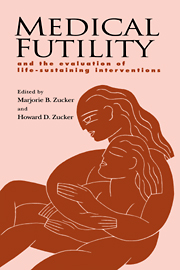Book contents
- Frontmatter
- Contents
- Preface
- Foreword
- Contributors
- 1 Medical futility: a useful concept?
- 2 Death with dignity?
- 3 Physicians and medical futility: experience in the critical care setting
- 4 Physicians and medical futility: experience in the setting of general medical care
- 5 Futility issues in pediatrics
- 6 Medical futility: a nursing home perspective
- 7 Alternative medicine and medical futility
- 8 How culture and religion affect attitudes toward medical futility
- 9 When religious beliefs and medical judgments conflict: civic polity and the social good
- 10 Conflict resolution: experience of consultation-liaison psychiatrists
- 11 Ethics committees and end-of-life decision making
- 12 The economics of futile interventions
- 13 Medical futility: a legal perspective
- 14 Professional and public community projects for developing medical futility guidelines
- 15 Community futility policies: the illusion of consensus?
- 16 Not quite the last word: scenarios and solutions
- Index of cited authors, cases, and statutes
- Subject index
15 - Community futility policies: the illusion of consensus?
Published online by Cambridge University Press: 11 September 2009
- Frontmatter
- Contents
- Preface
- Foreword
- Contributors
- 1 Medical futility: a useful concept?
- 2 Death with dignity?
- 3 Physicians and medical futility: experience in the critical care setting
- 4 Physicians and medical futility: experience in the setting of general medical care
- 5 Futility issues in pediatrics
- 6 Medical futility: a nursing home perspective
- 7 Alternative medicine and medical futility
- 8 How culture and religion affect attitudes toward medical futility
- 9 When religious beliefs and medical judgments conflict: civic polity and the social good
- 10 Conflict resolution: experience of consultation-liaison psychiatrists
- 11 Ethics committees and end-of-life decision making
- 12 The economics of futile interventions
- 13 Medical futility: a legal perspective
- 14 Professional and public community projects for developing medical futility guidelines
- 15 Community futility policies: the illusion of consensus?
- 16 Not quite the last word: scenarios and solutions
- Index of cited authors, cases, and statutes
- Subject index
Summary
The longer the problem of medical futility persists, the smaller will be the percentage of difficult futility cases that are resolved entirely between physicians and patients or their surrogates. Like many medical ethics problems, futility has become a matter of institutional, legislative, judicial, and scholarly concern. This is not unusual. What is unusual is the degree to which the issue of futility has been identified as a matter of community concern. For example, a brochure advertising a recent conference titled “A Community Policy on Medical Futility?” included the statement, “We believe that implementation of a consensus community standard embracing the full spectrum of public and professional opinion is the only way to ensure rational and ethical guidelines for medical practice” (Duke University 1995). Efforts across the country to develop community futility policies are underway in Colorado, California, Texas, and elsewhere (see Chapter 14).
For example, a citywide task force on medical futility has been established in Houston. Professionals from nine health care organizations are participating. After a basic philosophy was agreed on, a committee began to develop guidelines to help member institutions develop institutional futility policies and to draft and obtain support for legislation consistent with those guidelines. The committee produced four principles and nine procedural steps, which have been summarized by Pentz (Pentz 1995)
GUIDe (now called The Colorado Collective for Medical Decisions) is a group of Denver health care providers that began organizing in 1993 to create community clinical standards for withholding futile treatment.
- Type
- Chapter
- Information
- Medical FutilityAnd the Evaluation of Life-Sustaining Interventions, pp. 168 - 178Publisher: Cambridge University PressPrint publication year: 1997
- 1
- Cited by



